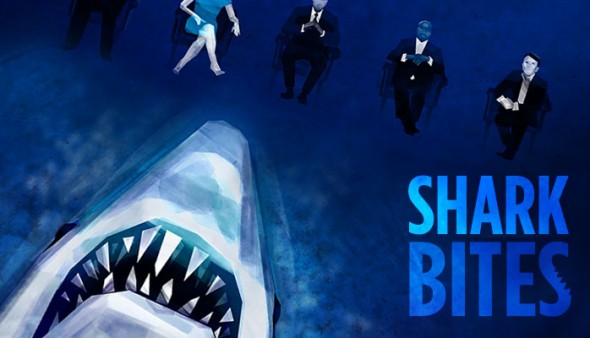 Shark Bites is a brand new book about Shark Tank that just published today – the same day as the airing of the season seven premier. Shark Bites is all about how Shark Tank has changed the lives of dozens of entrepreneurs who have appeared on the show. It features in-depth interviews with entrepreneurs who appeared on the show; in the book, the tell some of the “untold stories” you won’t read about in standard “PR style” news interviews and releases.
Shark Bites is a brand new book about Shark Tank that just published today – the same day as the airing of the season seven premier. Shark Bites is all about how Shark Tank has changed the lives of dozens of entrepreneurs who have appeared on the show. It features in-depth interviews with entrepreneurs who appeared on the show; in the book, the tell some of the “untold stories” you won’t read about in standard “PR style” news interviews and releases.
The best part of the book, in my humble opinion, is the foreword. The reason I say that is, I wrote it! The first part of the book, penned by Scott Jordan, highlights his entire appearance, from pre-show planning to years after his episode aired. When Scott first aired in season three, I was on the phone with him getting his side of the story at 9 AM the next day. I felt I needed to “come to his defense” in the aftermath of what I believed was an unfair edit. Little did I know at the time, Scott doesn’t need anyone defending him; he does a fine job all by himself! Since then we’ve cultivated an internet friendship and he’s been a fairly frequent contributor to the Shark Tank Blog.
Far more compelling (sorry Scott) is the second part of the book which tells how some entrepreneurs dealt with the aftermath of their Shark Tank appearance. Whether they found success, peace, or bitterness, Shark Bites tells it like it is in their own words.
The best part is, all the proceeds from the sale of the book benefit a charity called The Hunger Coalition. Pick it up on Amazon today.
Shark Bites Beyond the Tank
Beyond the Tank, Shark Tank’s spin-off that tells of successful businesses and those who found inspiration after the show, has its place. Shark Bites highlights the Other Side of the Tank, instead. Whether someone got an offer, offer rejected, deal, or no deal… where are the rest of the Shark Tank entrepreneurs, and what did they learn from their experience after their 15 minutes of fame?
Many entrepreneurs candidly comment on their experiences, including the owners of the following businesses: Eco-Nuts, Kitchen Safe, XeroShoes, Sticky Ties, PSI Bands, Qubits, The Spatty, Cuddletunes, Hold Your Haunches, Buzzy, The ProFender, ShowNo, RootSuit, Cheekd, Hot Tot, Nardo’s Natural, OrigAudio, Cheerful Child, SendABall, Amber, and more. Some entrepreneurs chose to remain anonymous, probably because they feared violating their non-disclosure agreements with ABC.
Anonymous or not, the entrepreneurs’ comments go well beyond the Tank. They highlight the good, the bad, and the ugly. If you like Shark Tank, Shark Bites is a very entertaining read!
Shark Bites Foreword
I was honored to be asked to write the foreword for Shark Bites. I’ve interviewed many of the entrepreneurs who are in the book and I already knew the “other side of the story” in most cases. I never publish anything that could hurt a business after they appear – if I did, nobody would ever grant me another interview!
To whet your whistle, I am including the text of the foreword I wrote. Enjoy:
The American Dream is ingrained in our culture. The notion that anyone can build a better mousetrap and create wealth and success for themselves, regardless of their background or upbringing, is an integral part of American life. From the most powerful CEO to the lowest criminal, nearly everyone in our society has the entrepreneurial bug. Whether it’s a kid selling lemonade out in front of her house, a college student trying to develop the latest app, or a guy designing and selling innovative clothing, the idea that a person can create success for themselves is a basic human – and largely American – trait.
Shark Tank premiered when the country was going through tough times and many were losing faith in The Dream. With the bank crisis of the late 2000’s, the perceived unfriendly climate toward business, rampant unemployment, and the exodus of manufacturing and R&D jobs to foreign soil, many Americans lost some hope for the future. One thing we did not lose is the idea “that all men are created equal, that they are endowed by their Creator with certain unalienable Rights, that among these are Life, Liberty and the pursuit of Happiness.” We have not lost the American Dream – the idea that anyone, through their own efforts, can pull themselves up and make their lives better. When the Founding Fathers crafted the Declaration of Independence, their notion of “Happiness” was meant in an economic sense. They believed everyone should have the right to pursue a better economic reality for themselves by creating businesses, communities, and industries.
This is why Shark Tank appeals to the American public. It’s an hour-long, weekly affirmation that the American Dream is alive and well. The TV show is part entrepreneurial voyeurism, part game show, part business lesson, and 100% entertaining. Stand up paddle board merchant Stephan Aarstol from season three’s Tower Paddle Boards called the Shark Tank a “master’s level business class in negotiation.” While the viewer only gets a small glimpse of the actual negotiations, what we do see sparks conversations about negotiating and business. Whether it’s a “true” representation of how businesses negotiate venture capital deals is debatable, but the show gives us a close-up look at the aspirations of American entrepreneurs in a forum that makes for compelling television.
Critics say Shark Tank fosters a “wantrepreneurism” culture that uses the implied infallibility of the Sharks to create an illusion of pseudo-dependency on the entrepreneur/Shark relationship. Even the opening credits say entrepreneurs are looking to the Sharks to “start, grow, or save their businesses.” Many businesses did get started on Shark Tank, many have grown, some may even have been saved, but believing a Shark will magically make a bad business good is folly.
Reality television shows – a genre that first appeared en masse less than 20 years ago – now litter the TV landscape. What makes Shark Tank unique, within the Reality TV genre, is the participants (i.e. the entrepreneurs pitching the Sharks) have a vested interest in continuing to tell their story long after their segment airs – especially since the show went into syndication. After all, they have a product to sell and a business to run. Nearly all of the entrepreneurs I spoke to over the years truly believed in their businesses, and believed they would grow and prosper. “Win or lose,” nearly every single entrepreneur I spoke to who appeared on the show claimed their Shark Tank appearance “accelerated the process.”
Businesses that get and close a deal with a Shark have something far more valuable than any Shark’s cash, they get the benefit of access to continued exposure. A deal with a Shark assures continued television appearances on morning news and talk shows, business shows, even Shark Tank’s own spin-off – Beyond the Tank. One thing is certain, staying out in front of a mass TV audience over time builds brands faster and sells more products. While many businesses manage to create and maintain that level of exposure for themselves, the ease of access Shark’s business partners have to mass media is an unquantifiable benefit.
Shark Tank, as both business vehicle and entertainment, will likely continue to draw viewers as long as the stories of the entrepreneurs are compelling and the Sharks continue their bombastic banter during pitches. More than 50% of viewers tune in to see the Sharks “give it” to would-be business partners. As Arlene Battishill from season three’s GoGo Gear said, “the Sharks are the stars, the entrepreneurs are the props.” This prurient display of venture capitalism entertains in a unique way, as evidenced by the increasing number of “copycat” shows seeking to cash in on The Shark Tank Effect and by the long runs of its predecessors in Japan, the UK, and Canada.
Shark Tank, like other TV shows with long runs, will need to maintain its edge to stay relevant. As soon as the interactions between Sharks and entrepreneurs seem contrived, or the quality level of businesses declines, the show will lose its appeal. For now, it seems the entrepreneur is becoming the new “rock star” and the interest in business and entrepreneurship is at an all time high. This bodes well for Shark Tank and for those seeking to leverage its popularity by appearing on the show. Interest in the “back stories” will continue to grow, ratings will stay high, and many businesses will get unparalleled exposure by prostrating themselves to a slickly edited, 8 minute dissection of their business.
Shark Tank is reality TV at its best, just remember that it is 90% TV and 10% reality!







Speak Your Mind